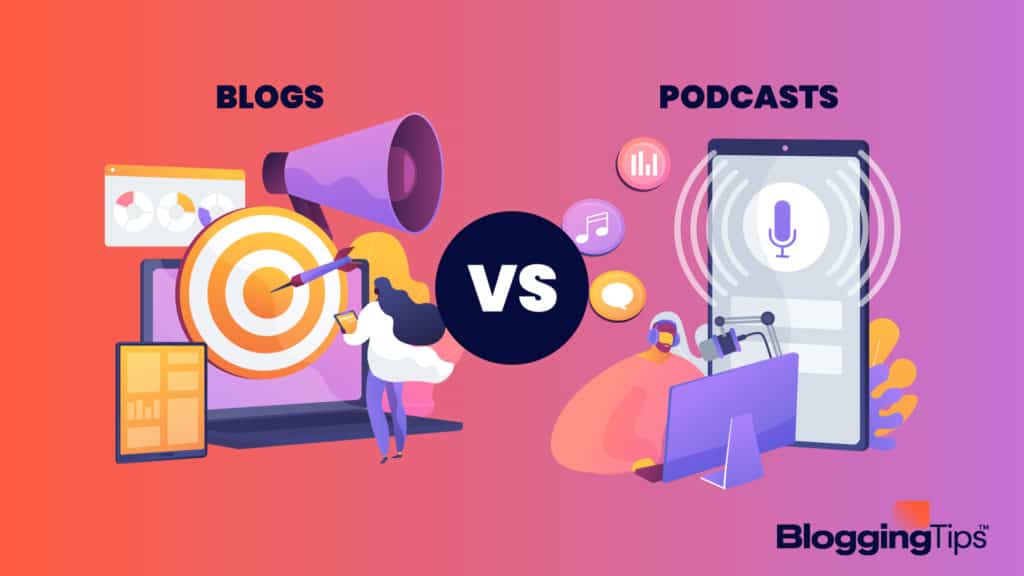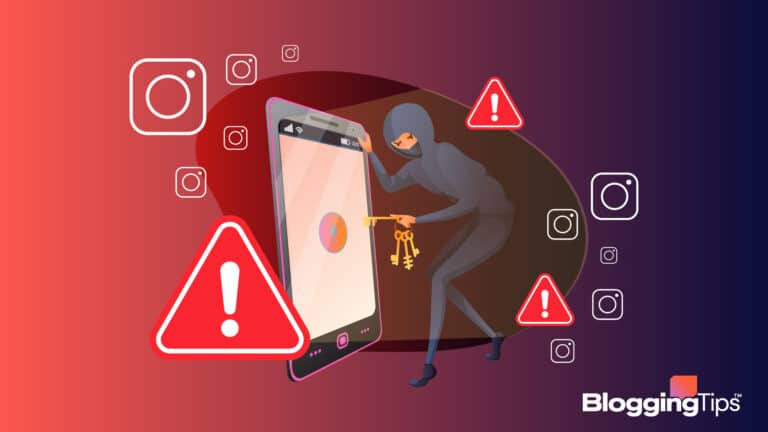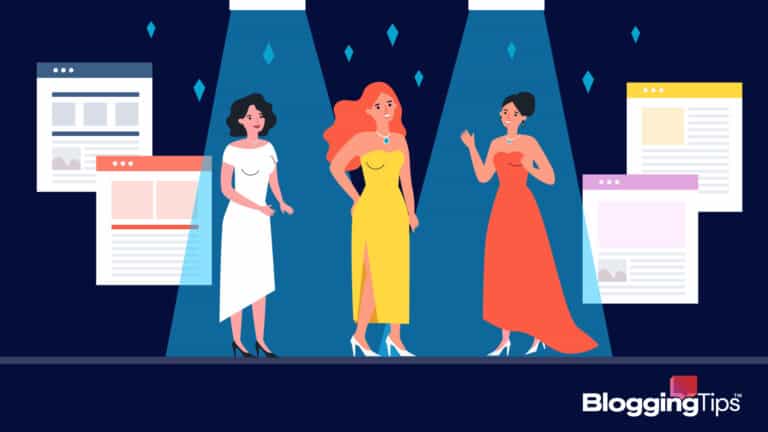As a content creator or business owner, you’ve probably considered starting a blog, podcast, or both.
Each option is an excellent way to spread the word about your brand while encouraging interaction with your target users.
However, you also know there are significant differences between a podcast vs. a blog.
Podcasts Vs. Blogs: An Overview
The primary difference between a podcast and a blog is the medium.
Podcasts are accessible through apps like Spotify, Apple Podcasts, or YouTube, and can be either video or audio.
On the other hand, a blog is written content available all over the web.
Podcasts
Podcasts are a classic form of reaching your listeners reimagined for 21st-century listeners.
What Is a Podcast
A podcast is essentially an online radio show you can access via streaming apps.
Although podcasts started as strictly audio, many podcasts also air their show on video apps such as YouTube.
What Makes a Podcast Stand Out?
A podcast stands out from a blog because it doesn’t require users to read the content.
Instead, they can simply log into a streaming app or sign onto a site to listen to your content.
Pros of Podcasts
Pros of podcasts include:
- Accessible anywhere
- No need to focus on reading
- Great for vision-impaired users
- Flexibility
The main pro of podcasts is their flexibility.
Users typically have the option of listening or viewing each episode, or reading a transcript, depending on the creator. Most podcasts are successful with the assistance of the best podcast agencies since they ensure quality and distribution while also creating and promoting podcasts for other businesses.
Cons of Podcasts
The main downsides of podcasts are the following:
- Require expensive editing and recording equipment
- Listeners can’t always access the content when in public
The gear needed for a podcast is costly and requires knowledge to use effectively.
If you’re a listener, you’ll need a device to play and listen on, along with headphones for privacy.
Blogs
Blogs have been around for several decades.
Originally called web logs, a blog is an efficient way of disseminating information in simple or complex terms.
What Is a Blog?
A blog is written content provided by bloggers in any niche you can imagine.
Bloggers write their content and allow users to interact in the comment section.
You can find them all over the web, on both blogging sites and as a subsection of business sites.
What Makes Blogs Stand Out?
Blogs are ideal because there’s quite literally a blog for every topic.
From cooking to book restoration, users can find a blog that suits their interests.
Pros of Blogs
A blog’s main pro is that it requires significantly less effort to produce.
Bloggers can write anywhere from any device.
Other benefits include:
- Less reliance on follower count
- Many users prefer to read than listen
- It doesn’t require significant knowledge to create a blog
Cons of Blogs
Although blogs are ideal for sharing content, they also have their downsides.
The downside of blogs include:
- Can get lost in a sea of lookalikes
- A large initial time investment for moderate success
Podcasts Vs. Blogs: Detailed Comparison
Now that we have the basics out of the way, it’s time to discuss the more granular differences between blogs and podcasts.
Which Is More Popular?
Although blogs continue to be a popular means of gathering information, podcasts are on the upswing.
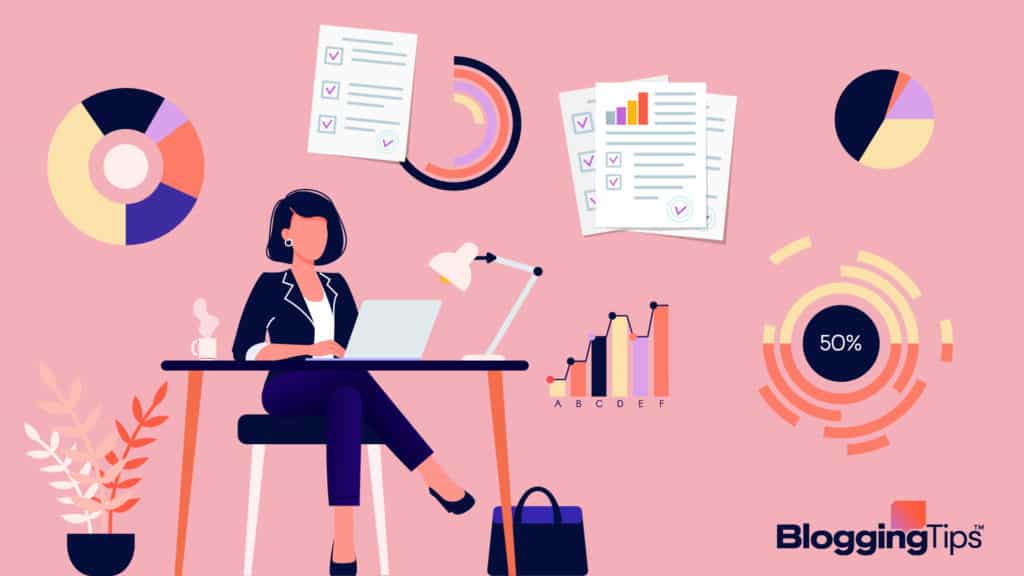
How Popular Are Podcasts?
Podcasts have increased in popularity exponentially in the past decade.
According to Statista, only 32 million people listened to a podcast each month in 2006.
As of 2021, that number increased more than tenfold to 164 million per month.
Of course, this doesn’t factor in the number of podcasters who also run a YouTube channel to stream their episodes.
Podcasts are most popular with millennials.
Most podcasts are consumed via Spotify, with news and comedy being the most popular genres.
As of 2022, more than 2.4 million podcasts are available, consisting of nearly 70 million episodes.
How Popular Are Blogs?
Although podcasts number in the millions, blogs are far more prolific.
According to Ahrefs, as of 2022, nearly 2 billion websites host over 600 million blogs.
In addition, approximately 75% of internet users have read or currently read blogs regularly.
The most popular blog genres are food and travel.
Many blogs are used as a form of content marketing alongside social media or online advertising.
However, since many, if not most, of those blogs won’t see success, new bloggers will have their work cut out when it comes to competition.
Podcast vs. Blog Popularity
Here are a few key takeaways when considering blog and podcast popularity:
- Choose the best format for your niche.
- Examine the trends and see how you can improve on them.
- Be sure to find a niche that’s in demand yet sparsely populated.
Which Makes More Money?
Bloggers and podcasters can each make a modest living from their blogs, but there’s no set rule on which makes more.
Although some podcasters and bloggers make it big, that tends to be the exception, not the rule.
In addition, those who generate high income must put in months or even years of work to establish their brand.

How Much Do Podcasts Make?
A typical podcaster with roughly 10,000 downloads for each podcast episode can expect anywhere from $500 to $900 per podcast.
In addition, advertising and marketing, including affiliate marketing, can increase your income.
What you make as a podcaster will depend on your niche, how frequently you produce content, and the platforms you use.
For example, a podcaster with a specialized niche who uploads content twice a week will gain more revenue than one who only uploads twice a month.
How Much Do Blogs Make?
Blogger income is a bit more nuanced than podcast income.
Whereas podcasts require a download, ad deals, or membership subscriptions for income, the amount bloggers make will depend on traffic to their site and interaction once a user arrives.
According to Indeed, the average blogger makes approximately $39,000 annually, equivalent to roughly 800,000 podcast downloads.
As with podcasting, this depends on advertising, marketing, and your audience size.
Most importantly, it depends on your niche and target audience.
Podcast vs. Blog Revenue
The key takeaways for podcast and blog revenue are:
- You shouldn’t expect to make it big right away
- High revenue requires significant time and effort
- You’ll go through a lot of trial and error before gaining success
Getting Paid
If you’re new to digital content creation, you might be unsure how you’ll get paid.
As it happens, there are several ways podcasters and bloggers get paid.
Both depend on how often users access your content and where they do it.
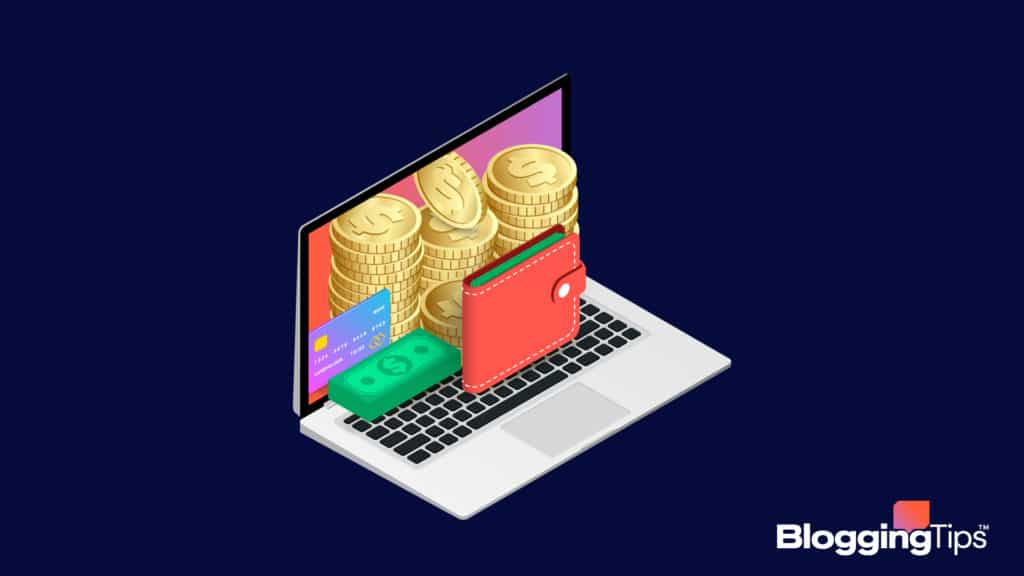
How Do Podcasters Get Paid?
Absent any other form of revenue, podcasters make money through sponsors and affiliate programs.
Many also receive donations or sell memberships to their content.
However, advertising and sponsorships are the ideal places to start if you want to monetize your content.
Although you don’t need a huge following to find sponsors, you’ll have more luck if you have at least 5,000 downloads per month.
The best way to find sponsors is to reach out to them directly.
You can also try partnering with a hosting service, such as Buzzsprout, joining a podcast network, or joining a podcast directory.
How Do Bloggers Get Paid?
As with podcasting, affiliate marketing is the best way to make money as a blogger.
Bloggers who use affiliate marketing programs will run advertisements on their sites that generate revenue with each click.
In addition to advertising revenue, bloggers can directly link to an online store where readers can purchase products or services.
They can also generate income on social media or by guest posting for other bloggers.
Podcast vs. Blog Getting Paid
The bottom line for payments for bloggers versus podcasters is as follows:
- Bloggers have more easily-accessible options for revenue
- Podcasters have to rely on listeners manually finding sponsor sites
- Both options typically include access to unique discount codes
- The more successful you are, the bigger the sponsors you’ll get
Costs To Get Started
On the surface, it might seem as though podcasts and blogs can be relatively inexpensive to create and publish.
However, that’s not entirely true.
There are many areas where content creators can save money.
Still, when it comes to making a name for yourself with your target market, you’ll have to spend money to make money.
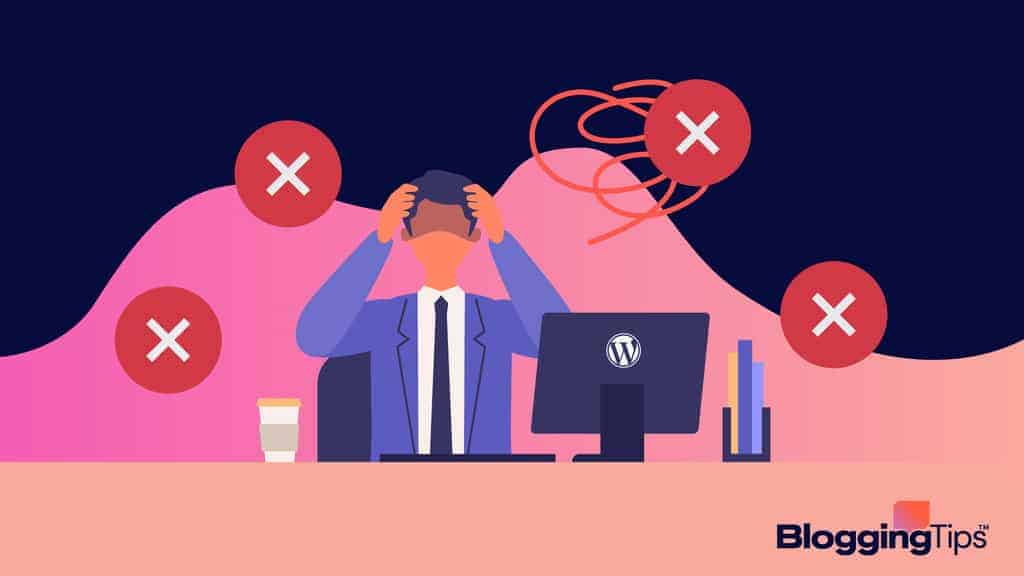
Costs To Start a Blog
Between podcasts and blogs, a blog is much easier to do on a budget.
For example, you can design and host a site for free, post your own content, and maintain your site yourself to avoid costs early on.
That said, there are some costs that’ll ultimately become necessary.
Advertising
Advertising is a vital part of monetizing your content.
For most bloggers, affiliate ads are where they make their money.
They’re an ideal form of income because they’re mutually beneficial.
Hosting
Although you can host your website on WordPress.com for free, you should consider a paid hosting service through WordPress.org.
You’ll get better security and flexibility on how much you can publish.
Branding
If you’re handy with graphic design software and have a good eye, you can try your hand at designing your logo and aesthetic.
However, many bloggers choose to hire a graphic designer to do it for them.
Site Design
Although WordPress makes it easy to design a beautiful blog using a WordPress theme, you might want to hand over the reins to a professional.
A website designer can give you a unique site that perfectly suits your brand.
Time
Time spent researching and crafting each blog post might not cost money, but it can take away from other business pursuits.
However, fully understanding search engine optimization (SEO) and market research is crucial to blogging success.
Costs To Start a Podcast
As a fledgling podcast host, you can find plenty of ways to podcast on a budget.
Between equipment, hosting, and marketing, you can start a podcast for relatively cheap.
Still, podcasting costs are typically significantly higher than blogging.
Equipment
First and foremost, all podcasters need equipment.
Specifically, you’ll need:
- Computer
- Microphone
- Podcast production and editing software
- Headphones
As you continue your podcasting career, you might add more substantial purchases, including a production booth or soundproofing equipment.
Advertising
As with blogging, you’ll need a robust marketing campaign for your podcast.
If you’re fluent in social media, you might be able to do a lot of marketing for free.
However, paid ads are ideal for targeting your market and are an excellent way to nail the SEO needed for podcasts.
Branding
All podcasts need branding, even though they’re an audio medium.
You’ll need a podcast cover that stands out and things that draw the ear, like a quirky catchphrase.
Site Design
Most podcasters will have a companion website that provides easy access to their content.
You can design a site yourself or pay someone to manage the upkeep for you.
Hosting
Finally, you’ll need to find a host for your podcast.
Platforms like Buzzsprouts, Captivate, and RSS are all popular and efficient hosts for podcasts.
Costs of Starting a Blog vs. Podcast
To start a blog, prepare to shell out money for these costs:
- Advertising
- Hosting
- Branding
- Site design
To start a podcast, you’ll need the following:
- Equipment
- Advertising
- Site design
- Hosting
Frequently Asked Questions
Do you still have questions about starting up a blog or podcast?
Here are a few common questions about podcasts vs. blogs.
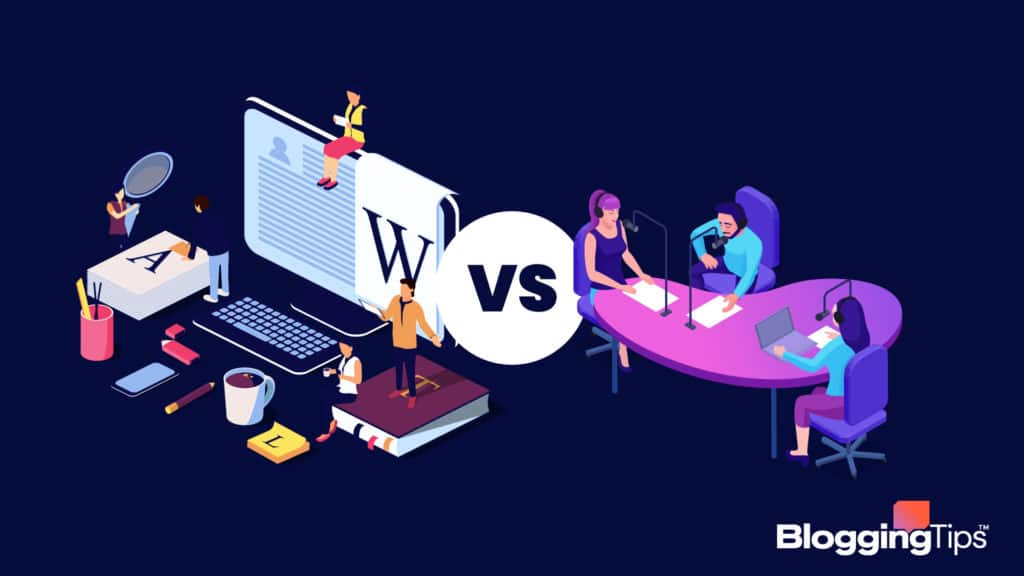
What is the difference between a blog and a vlog?
A blog is a form of written content.
It can be in short or long form.
A vlog is a video blog, meaning everything you post is focused on video content.
What is the difference between blogs and wikis?
The primary difference between a blog and a wiki is that a blog is owned and updated by one person or entity.
On the other hand, a wiki, such as Wikipedia, can be edited by anyone.
The Verdict: A Podcast vs. a Blog
Above is everything you need to know about running a podcast vs. a blog.
Use a blog if:
- You prefer written content
- You don’t want to spend a lot of time courting sponsors
- You have the time and inclination to design a site
If this sounds like you, it’s time to get started on your blog today.
Use a podcast if:
- You prefer audio content
- You don’t want your content tied to a website
- You want to branch into video content
Podcasting isn’t for everyone, but if you think it’ll fit your style, start planning your course immediately.
